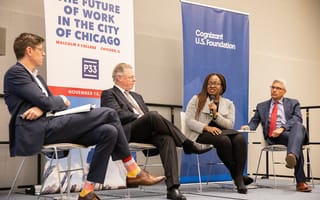
Project 2033 (P33) CEO Brad Henderson stood in front of a Monday morning gathering of Chicago tech stakeholders and described his family’s trajectory from poverty into the middle class.
For about 200 years, he said, Henderson’s family held working-class jobs in West Virginia. His grandfather, however, secured a 40-year career at a Cleveland steel company that enabled him to send his children to college. He landed this job by presenting himself at the steel company, totally untrained.
Today, careers look different.
The rise of automation and robotics is transforming the global workforce, upending traditional working class jobs and leaving corporations with unfilled technical roles. Without a plan for accessible skill training, the pathway to the middle class could become even steeper for countless people.
That’s why local and national leaders (including Henderson; Alastair Fitzpayne of the Aspen Institute Future of Work Initiative; DK Sinha of Cognizant; Andreas Cangellaris of University of Illinois; Helen Adeosun of CareAcademy; and Juan Salgado of City Colleges of Chicago) led a community discussion this morning at Malcolm X College on the future of work in Chicago.
The event was part of the larger P33 initiative, spearheaded by former U.S. Secretary of Commerce Penny Pritzker; Cleversafe and Ocient founder Chris Gladwin; and Civic Committee and Commercial Club of Chicago president Kelly Welsh. P33 is a cross-functional, private-sector-led task force dedicated to bolstering Chicago’s economic equity and outcomes by transforming the city into a leading global tech hub.
Naturally, this goal is easier said than done, and today’s speakers explored what needs to happen in terms of education and training to prepare Chicago’s workforce for what’s ahead.
An overarching theme was the limitations of traditional degree programs to accommodate the changes that will come with the so-called Fourth Industrial Revolution, or, as Cangellaris preferred to call it, the “human-centered revolution.” He pointed to a projection that two-thirds of today’s primary school students will hold “new economy” jobs, maybe of which don’t yet exist.
To help these students — and existing workers — create and capture these jobs, he suggested institutions lean into offerings such as modular classes, stackable certificates and course credit for job experience.
Salgado echoed this sentiment but called for more robust private and public funding for community colleges to allow a wider variety of learners to access those options.
“Monetary access is only the beginning of access,” he said. “It’s a level of support that must be achieved to ensure the adult learner is set up for success.”

Adeosun shared an example of private-sector support for adult learners. Through her startup CareAcademy, she's is bringing industry-specific certificate programs directly to the workers who want them. CareAcademy provides online training for home care agencies and their employees, saving agencies money and helping more people secure stable careers with upward mobility.
When she and her co-founder Madhuri Reddy first started, people told them online classes were a risky option because their target demographics lacked the technology skills. As it happened, those people were wrong — she cited a 2014 Pew Research Center study showing that black and Hispanic people are far more likely to use their smartphones for job and education-related tasks. Now, the online courses have helped 55,000 caregivers enhance their careers.
“The works always exists in removing our biases and entering a new paradigm that puts the learner first,” she said.
The three panelists agreed it’s essential to convince local corporations that up-skilling existing and incoming employees is a matter of survival in the new economy — and not just because it boosts the bottom line.
“When it comes to that bottom-line thinking, we have to help businesses think beyond today and build up employees as learners, so that it’s not just transactional,” Adeosun added.
Overall, each speaker used his or her expertise to build an overarching argument for continuous learning, or the idea that tomorrow’s workforce will need structured ways to train and up-skill ongoingly, making adult learners the norm rather than the exception.
Fitzpayne and the Aspen Institute are partnering with stakeholders in four American cities — Chicago, Phoenix, Hartford and Charlotte — to learn more about continuous learning options and develop action plans. The Institute will work with P33, with the help of a $1.25 million grant from the Cognizant U.S. Foundation, to move toward a roadmap for equitable continuous learning in Chicago.
“There are a lot of really interesting models and institutions that are leading the charge in Chicago. I think the question is how do you begin, as a city, to tie all these efforts together and give people a better sense of what these different pathways potentially look like,” Fitzpayne told Built In. “We’re trying to figure out a way to demystify and simplify the ability to move in and out of the education and training system once you're in the workforce.”
Monday morning’s event was all about ideas, and the most challenging aspects of P33’s work lie ahead: Pivoting from data-gathering and planning to implementation. Chicago’s social and economic challenges aren’t small, but P33’s leaders are committed to moving beyond the good ideas, P33 SVP of workforce innovation Matthew Muench told Built In.
“If you want to be positive about it, which I do, you can view [the shifting economy] as an opportunity. This is actually a watershed moment to right some longtime inequities in the workforce,” he said. “We need to be very quick and very action-oriented.”




